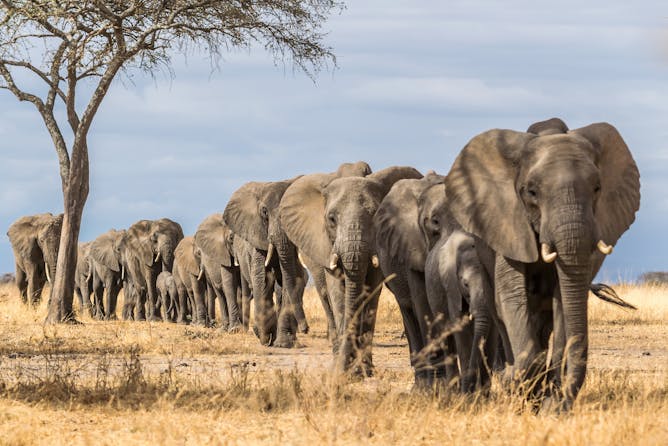|
In the 1800s there were 26 million African elephants. Today the number only just clears 400 000. Their decimation can be blamed on colonialism as well as shrinking habitats and poaching. Now this endangered species face a new threat. Shrinking water supplies. As Rachael Gross and Rob Heinsohn explain, ensuring African elephants survive drought will increasingly require new conservation strategies, including community-based management. Without this, their
numbers will continue to decline.
Zambia has rich reserves of copper and cobalt. Both are critical for the development of renewable energy technologies, such as wind and solar, as well as in the production of electric vehicles. Copper demand is expected to increase up to threefold by 2040. But, as Twivwe Siwale and Eric Werker, argue, successive rises in copper prices have not translated into reducing poverty or inequality. Reaping the rewards of a spike in demand will require the government
to start harnessing the non-tax benefits of mining - the opportunities that stem from the mining activity itself – rather than simply focusing on extracting benefit from the commodity alone.
|

Rachael Gross, Australian National University; Rob Heinsohn, Australian National University
If the situation doesn’t change, Africa – indeed, the world – may lose one of its most iconic animal species.
|

Twivwe Siwale, London School of Economics and Political Science; Eric Werker, Simon Fraser University
The coming copper boom presents Zambia with an extraordinary opportunity – not only to enable mining profits, but to power inclusive growth.
|
|
|
-
Jeremy Berg, University of Pittsburgh
Many microscopy techniques have won Nobel Prizes over the years. Advancements like cryo-ET that allow scientists to see the individual atoms of cells can reveal their biological functions.
-
Fiona Woollard, University of Southampton
A philosopher offers advice on how mothers could stop being pitted against each other.
-
Rebecca Senf, University of Arizona
In a 1959 essay, Capote noted how Avedon seemed to capture ‘every hard-earned crow’s foot’ in his subjects – perhaps not realizing that he would one day be photographed by that same unvarnished gaze.
-
Anders Götherström, Stockholm University; Ricardo Rodriguez Varela, Stockholm University
DNA analysis reveals a large migration of people into Scandinavia during Viking times.
-
Luciano Rodrigues Viana, Université du Québec à Chicoutimi (UQAC); Charles Marty, Université du Québec à Chicoutimi (UQAC); Jean-François Boucher, Université du Québec à Chicoutimi (UQAC); Pierre-Luc Dessureault, Université du Québec à Chicoutimi (UQAC)
Coffee capsules aren’t the biggest carbon culprits. It’s better to use a capsule than to waste coffee and water.
|
|

Rachel Paine Caufield, Drake University
What happens if GOP holdouts continue to hold out on the speaker position? And what if they don’t?
|

Paul Hunter, University of East Anglia
China pursued COVID zero for too long and is now paying the price. But the rest of the world doesn’t have too much to worry about.
|

Boaz Atzili, American University School of International Service
Israel’s most far-right and religious ruling coalition, which just assumed power, poses a profound threat to the country’s democratic institutions, from the courts to individual rights.
|